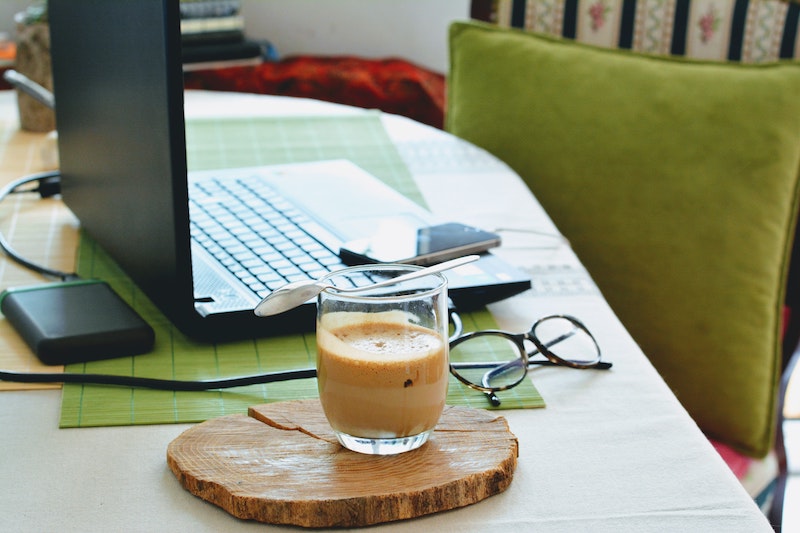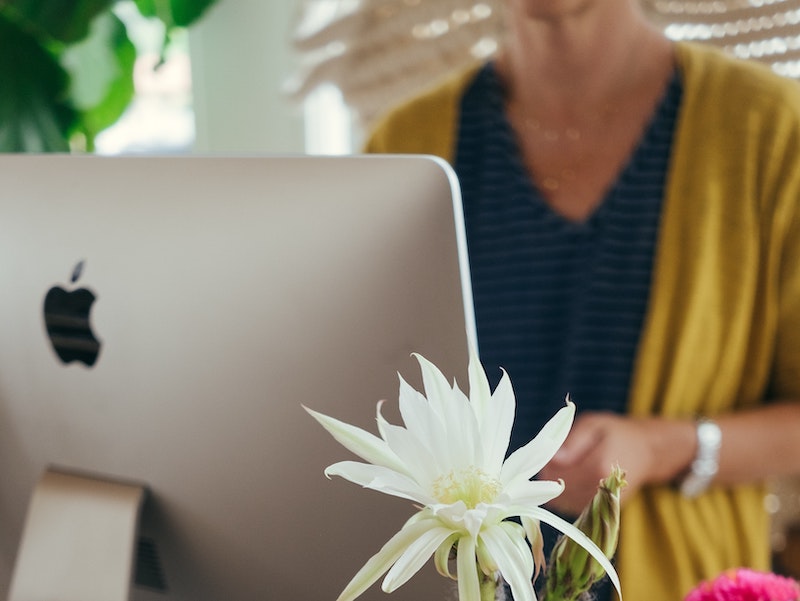This post may contain affiliate links. Full disclosure policy

For the last fifteen years, I’ve been primarily working from home. It took me a good ten years to get good at it.
At this point, the thought of working in an office with other people is my idea of a nightmare. I’m at my most creative, productive, and content when working from home. But establishing the work routines that helped me flourish from home didn’t happen overnight.
But now, with practically a snap of the fingers, millions and millions of people are being asked to work at home. And many of them are extroverts!
Oh, you poor darlings. I feel for you. I really do.
WORKING FROM HOME IS EASIER FOR SOME
Most novelists are at least somewhat introverted. We like being alone. In fact, most of us require significant blocks of time alone. My biggest problem right now is that there are two other people in my house, twenty-four hours a day.
I truly love my husband and my mother. And I am genuinely happy that they are here with me and safe. I wouldn’t have it any other way just now. However, they are currently occupying space that normally belongs only to me and the Imaginary People.
THIS IS A PROBLEM!
You see, the Imaginary People are shy. If other people are around, they leave. And if those other people talk, they leave fast. My husband and mother are world-class talkers. They talk. They comment. Worst of all, they ask questions. Of me.
I haven’t seen an Imaginary Person in days. Oh well. I guess they’ll come back eventually. Let’s get back to you and the problem of establishing a routine for working from home.
My idea for this post came from a conversation with one of my sisters. For the first time ever, she’s having to work from home and not finding it easy. Last night she called and said (in a very plaintive tone), “How do you do this?”
I get it. Establishing a work routine if when you’re homebound can be tough, especially if you’ve never done it before. However, over the years I’ve developed some tricks to help make my work from home workday more productive and enjoyable.
GET READY FOR THE DAY
There’s a myth out there that novelists spend the day pecking away on their laptops, having never changed out of their bathrobes and bunny slippers.
Uh…no.

Okay, I can’t speak for every novelist on the face of the earth. But everybody I know gets up in the morning, showers, and gets dressed for work. True, for most of us, every day is casual Friday. We wear jeans and a sweater, or something equally comfortable. Some of us (including me) add makeup, earrings, and real shoes to the mix.
But no matter how dressed up or down we are when the workday begins, we do get dressed. Showering and dressing is an important ritual in preparing for a day at the office. It helps our brain shift into gear and helps us focus on the tasks at hand.
If you’ve never worked at home before, the idea of working in your jammies is appealing. I understand. But after a while, it just makes you feel kind of icky and gross.
It also makes it hard to distinguish Work Time from Life Time, which is important if you want to establish productive work routines when you’re homebound. Blurring the line between work and regular life is a recipe for unhappiness – trust me on this.
KEEP OFFICE HOURS
Establishing personal office hours will go a long way in keeping that line between work and life from blurring.
Decide in advance when your day will start and when it will end and keep to that schedule. This is so important! It’s also important to decide when you’re going to take lunch or other breaks. For some people, lunch will be enough of a break. But if you’re not used to working by yourself, scheduling a couple of short breaks to call a friend or colleague will help you feel more connected and less lonely.
Resist the temptation to eat at your desk. Getting up, walking around a little, and having a healthy meal will do wonders for your body, brain, and attitude. Consider adding a walk to your lunch break routine. Even a short walk can refresh you for the rest of the day.
MAKE A LIST
As soon as you get to your desk, make a list of three to six important things you want to accomplish that day. (Studies have shown that we really can’t finish more than six major tasks in a day, so resist the temptation to add more.)
I’m not talking about those little 5 or 10-minute phone calls or to-dos. The items that make it on your list should be meaningful projects or steps within a project that you’d feel good about completing.
Crossing those items off your list as you complete them will give you a sense of accomplishment. It’s also a good substitute for the kind of feedback or encouragement you might normally be getting from co-workers or your boss.

USE TIME BLOCKING
Time blocking is one of those things that could really be a post all by itself. But in its simplest form, time blocking is exactly what it sounds like – you simply block off a particular block of time for a specific task.
To be effective, I’ve found that time blocks should last at least 30 minutes long but no more than 2 hours. For example, I am writing this post in the two hour time block I set for myself this morning. While I am working on it, I will not allow myself to be distracted by anything else. When I’m finished with the block, I’ll take a break and then move on to another task.
The last thing I do before ending my day is fill in my time blocks for the next day. (My Living Well Planner makes this really easy.). That way, I don’t waste time the next morning trying to figure out what I should be doing.
ESTABLISH AN END OF DAY RITUAL
How you end the day is just as important as how you begin it.
My end of day routine takes about thirty minutes. I fill in my time blocks for the next day, jot down notes to myself about projects or tasks that extend beyond the next day, and then tidy up my desk.
Emptying my brain of worries and turning them into written reminders helps me make a smooth transition from Work Time to Life Time. As I said before, that is important! Barring unforeseen emergencies, you should stop working at the appointed hour and spend your evening relaxing, socializing, or doing non-work-related activities you enjoy.

Middle aged couple walking together holding hands along the beach boardwalk. Abstract image of Building relationships and marital bonds. Early evening sunset and warm summer tone
When you’re working from home, it’s so very easy let your work life seep over into your personal life – don’t do it! You can’t do your best work if you don’t leave time to rest your body and recharge your mental batteries.
Which leads me to my last tip…
TAKE THE WEEKEND OFF
One of the biggest challenges of working from home is resisting the temptation to make every day a workday. It’s just so easy to do – after all, your office is right there! I understand completely. But take it from one who has been there; more hours don’t translate into greater productivity.
In fact, studies have shown that productivity diminishes sharply when people work more than 50 hours a week. People who work 80 hours a week actually have no more output than those who work 50 hours. (And, as I know from experience, they are less happy!)
So, really, take the weekend off. You’ll have a better, more productive week if you do.
MAKING THE MOST OF IT
If you’ve never done it before, establishing a work from home routine when you’re homebound can be tough. Hopefully, the need for social distancing will end soon and people can get back to their offices.
Until then, I hope that employing some of the tips and routines I’ve developed over fifteen years of writing books at home will help make your workday easier, more productive, and more enjoyable.



